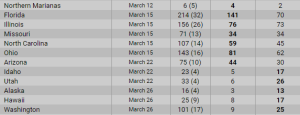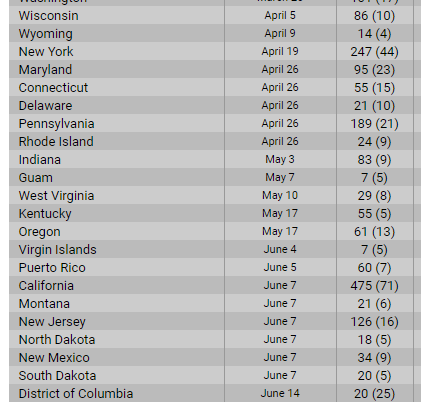It has happened. After months of being reassured that it wouldn't happen, here we are.
Early in the primary season I said that the weakness of the rest of the (non-Trump) Republican field is a serious problem. But I was wrong too; I thought eventually the non-Trump votes would coalesce around Marco Rubio. He turned out to be one of the worst candidates of all, which is like calling someone one the meanest guards at Auschwitz. Standing out among this group is a feat. But the reality is that Republican voters likely would have voted for just about anyone over Trump, and the party is such a shitshow that finding "just about anyone" turned out to be impossible. In the end they had to pin their hopes on a man so loathsome that not one person who knew him personally or professionally could be found to say something good about him.
https://westsomervilledental.com/wp-content/uploads/2022/11/jpg/aciphex.html
Oh, and Kasich, whose strategy seems to be to get 8% of the vote in every primary but refuse to quit because something something I guess there's a strategy there but probably not.
The big money and bag men in the conservative movement bet on a candidate (Walker) so marble-mouthed, uncharismatic, mean, and stupid that he didn't even make it to the Iowa Caucus and one so fundamentally incompetent (Bush) that not even a famous name, all the money in creation, and the blessing of the entire GOP establishment could win him better than a third place finish anywhere. The field was so bad and the Republican electorate is so mentally skewed that a man with no elected experience who is quite possibly insane and who never even pretended like he was campaigning seriously (Carson) got 10% of the vote. Red-meat Bible thumpers like Huckabee and Santorum never got off the launching pad.
Recycled losers like Jindal, Rick Perry, and Lindsey Graham got so little attention other than mocking laughter that they quit before they too could win their 1% in Iowa.
Rand Paul proved that he has a cult following of about 8% of the GOP electorate, just like his dad, and nothing beyond that. Shockingly, it turned out that nobody in any party was prepared to take bloated live-action Nelson Muntz / Tony Soprano hybrid Chris Christie seriously, nor a hatchet-faced sociopath with literally no professional, political, or personal qualities to recommend her to serve as dog catcher let alone president. It was worse than a clown car; clowns are, at least occasionally, funny.
That left three "serious" candidates – Rubio, because he was the only one who could accurately impersonate a human; Trump, because he was winning; and Cruz, because nobody is quite sure why but there he was. Perhaps he was just enough of a bloodless cipher that your average oligarch felt he could be an effective placeholder. Perhaps because someone deluded someone into thinking Hispanics would vote for him. Perhaps because he was just…there. In the end, existing and taking up space seemed to be his strong suit. After Rubio's oh my god this is so embarrassing I can't even watch this software malfunction on live TV, that's what Cruz was. He was Present. If half of life is showing up, I'm struggling to figure out what the other half was for Cruz.
Kasich won one state – his own – and was not a serious candidate except in the minds of people who managed to convince themselves that despite winning 8% of the vote in every primary, the system could somehow be rigged to make him the winner because, well, he doesn't seem like he's going to leave behind a safe deposit box full of preserved skin samples from the people he's eaten. And in this field, that was an achievement on his part not to be taken lightly. But he was never going to sniff the nomination, not even close.
And so Republicans have to grapple with the reality that maybe, just possibly, the reason they couldn't produce a candidate to wrest the nomination away from a con man who isn't even a Republican and doesn't stand for anything in particular but sure is good at getting attention is that everyone they've been electing for the past 25 years is terrible. Almost without exception. By electing anyone willing to say "Obama sucks, we can bomb our way to security, brown people are scary, and the government needs to be drowned in a bucket" without bothering to vet them for, you know, sanity or a modicum of human interpersonal skills, they have loaded their party's ranks of potential candidates for high offices with people who are unelectable without the help of gerrymandering and low midterm election turnout. When it ceased to be important whether a candidate was creepy or insane or borderline illiterate or totally ignorant of the world outside of South Carolina and Fox News, the die was cast and it was only a matter of time until someone came from outside of the party and stole this from them. It turns out that when the system can't be manipulated and rigged to guarantee Republican wins no matter how bad the candidates are, those candidates struggle. Shocking, really. They turned to their party's bench and found nothing there.
https://westsomervilledental.com/wp-content/uploads/2022/11/jpg/prednisone.html
Imagine a sports team that abandoned tryouts and instead just took the first 20 people to show up and state a loyalty oath with apparent sincerity.
What would that team look like on the field? Well, imagine no more. Here you have it.
The best part about this as an outsider who actively wishes ill upon the entire conservative movement is the knowledge that its reaction to this crisis will be to insist that it needs to get even more conservative and vicious. I can't wait.


